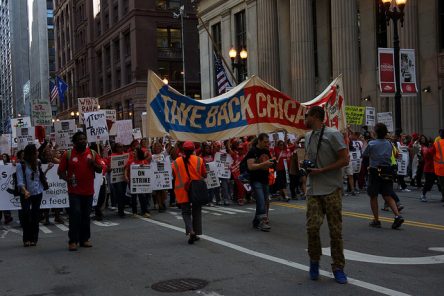
Rachel Docherty / Flickr
Teachers across the United States are having a moment. Educators are building on the momentum from West Virginia, where teachers went on strike for nearly two weeks to secure a series of victories, including a 5 percent pay raise for state employees. Now the protests have spread, from state-level actions in Arizona, Kentucky and Oklahoma to school-specific work stoppages in the nation’s capital. The educators are winning broad public support. But despite the popularity of their cause, politicians have harsh words for the teachers demanding educational justice.
Teachers are displaying a “thug mentality,” Kentucky Gov. Matt Bevin says. They’re asking for too much, like a “teenager wanting a better car,” according to Oklahoma Gov. Mary Fallin. That attitude has trickled down to the Oklahoma legislature, where state Rep. Kevin McDugle announced in a since-deleted Facebook Live video that he wouldn’t “vote for another stinking measure when they’re acting the way they’re acting.”
Is it really “selfish and short-sighted,” as Bevin phrased it, to demand a livable wage? Teachers have long lived on austerity salaries while seeing their benefits, from pension to healthcare, come under attack. They make less than other college graduates in each of the 50 states, and they are more likely than other workers to hold a second job.
But better pay isn’t all that’s compelling educators to act. Teachers are using the classroom to fight for the community. And in the process, they’re indicting some of the basic premises on which these politicians operate. Few people debate the government’s responsibility to provide a public education. Doesn’t that responsibility include providing adequate funding as well?
Not in Kentucky, where teachers had to protest to save a critical social service program, which nearly fell victim to state budget negotiations that prioritized tax cuts for the wealthy over everything else. Politicians in Oklahoma spent years on the same path, slashing taxes for oil and gas companies while letting schools suffer. The impact is tangible: thousands of people have shared now-viral photos of the battered textbooks used by the state’s students.
Some Oklahoma teachers have acknowledged they can simply cross a border and add thousands to their paychecks by working in a neighboring state. Even Oklahoma’s 2016 Teacher of the Year made the move to Texas after he realized he couldn’t pull together a decent living in his home state. Now he’s supporting his former colleagues from a distance as they push for the reforms that would allow the state’s students to get a decent education.
But for the teachers still in Oklahoma, leaving the state may be a short-term solution. According to an analysis from the Center on Budget and Policy Priorities, 29 states provided less overall state funding per student in 2015 than they did before the 2008 recession. The result: school conditions so poor that they’re forcing teachers to stand up and demand better.
In focusing on educational justice, teachers are taking notes from an historic labor moment that took place just a few years ago. When Chicago teachers stopped work in protest in 2012 — their first strike since 1987 — Mayor Rahm Emanuel said it was a “strike by choice” that Chicago’s kids didn’t deserve. But, as the Chicago Teachers Union made clear, the real choices harming school children in the city all came from government officials and the corporate interests that swayed them.
The union released a report pushing for proven reforms that would allow teachers to give students the best education possible, all while reducing inequities in the school system. The report provided plenty of funding mechanisms, from progressive taxation measures to closing corporate subsidies and loopholes, that could help pay for the school services most needed by students and their families.
Chicago’s teachers were bargaining for the common good — using a framework that brings community input into the collective bargaining process and links the success of workers to the health of their neighborhoods. After all, the teachers weren’t just pushing for better conditions for themselves. They wanted more for their students as well. They identified revenue sources that could pay for it all, provided city leaders listened to the people who elected them, rather than corporations benefiting from the low-tax status quo. The organizing tactic was a natural shift: this labor issue wasn’t only about paychecks and benefits. It was about justice in the classroom — and the community as a whole.
Local labor leaders have adopted similar tactics. Detroit teachers made national headlines in 2016 with “sickouts” in protest of the poor conditions in public schools — including black mold, rats, and lack of heat. The city teachers pointed out that suburban schools in the state would never be left to deteriorate in the same way.
The common good was also front and center when teachers in St. Paul narrowly avoided a strike earlier this year. The St. Paul Federation of Teachers included demands for racial equity in the classroom to their collective bargaining negotiations, which took place right as Super Bowl festivities kicked off across the Twin Cities. How could the state’s corporations fund football’s biggest game, the teachers argued, yet not pay enough in taxes to fully fund school districts?
The teachers striking today are using the same arguments. The Oklahoma Education Association has offered the legislature several revenue-raising options that would add more than $900 million to state coffers. Changes to income tax structures, like eliminating the capital gains deduction, could bring in nearly $180 million, the OEA says. Increasing the production tax on oil and gas companies that drill in the state could add almost $160 million more.
Just like the Chicago strike of 2012, the teacher protests taking place today aren’t a choice, but a response to one. State and local governments chose to slash funding for public schools. Teachers are fighting that decision — and for their communities, not just themselves. The only selfish and short-sighted thing to do is continue with a broken status quo.